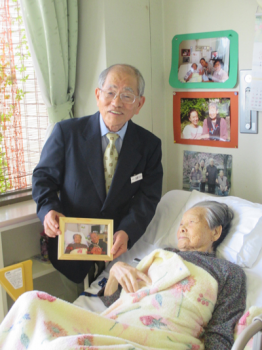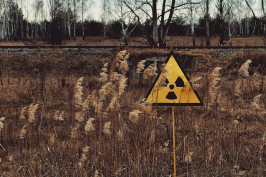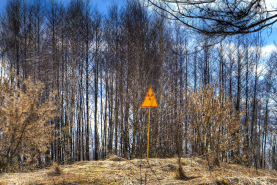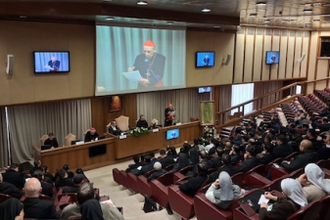Viewpoint: A healthy, sustainable future can only be nuclear-free

Hiroshima survivor
The coming year, 2016 will cast a spotlight once again on the victims of nuclear bombs as the British parliament debates the renewal of its Trident nuclear defence system. Elizabeth Ingrams went to Hiroshima to attend the first World Nuclear Victims' Forum, held at Hiroshima's Sunflower (Himawari) hall, 21-23 November 2015 to find out how survivors of exposure to radiation (either from weapons testing or power station accidents) from many different parts of the world, feel 70 years since the use of the first atomic bomb in WW2.
"A healthy, sustainable future can only be nuclear-free," began Dr Tilman Ruff, anti-nuclear campaigner in his keynote address to the conference, telling us that the World Health Organization holds nuclear weapons to be the "greatest immediate threat to global health and welfare."
A cancer survivor himself, who attributes his illness to the fallout of the British nuclear tests over South Australia, beginning with the so-called 'Totem One' test in 1953, Dr Ruff holds many positions including Associate Professor at the University of Melbourne and Co-President of the Australian Red Cross as well as founding Chair of ICAN, (International Campaign for the Abolition of Nuclear Weapons) established in 2009. His presentation included impressive statistics about the long-lasting effects on the climate and environment of any use of nuclear weapons, including global cooling which would result in crop reduction and widespread famine "the effects of which will be seen sixteen or more years later."
As Ruff noted, the very first UN General Assembly resolution, 70 years ago, on the 13th January 1946 was to ban nuclear weapons. Similarly, for 35 years the International Red Cross has been stating that nuclear weapons pose, "the greatest immediate threat to global health and welfare" so, although the humanitarian consequences of nuclear weapons are hardly a new angle, they have, according to Ruff, been 'side-lined'. They have only been highlighted again through the conferences organized by ICAN over the last three years in Oslo in 2012, Nayarit Mexico in 2013 and Vienna in 2014. He concluded "in the movement to ban nuclear weapons, stories of survivors are absolutely essential."
Karina Lester, a fellow countrywoman to Ruff, should know. She is an outspoken member of the Aborigine Anangu Pitjantjatjara Yankunytjatjar Lands community of South Australia, whose father Yami Lester was a self-declared victim of the UK's so-called 'Totem' nuclear tests in the 1950s.
"Aborigines with spears were allowed to walk through ground zero ... without any knowledge of radiation," she said, attributing her father's subsequent blindness to the effects of radiation.
Now a faculty member of the language department of the University of Adelaide, and a mother of two, she is currently raising concerns about the return of the royal commission to Australia, as uranium mines are to be re-opened in the wake of Australia's new deal to supply uranium for India's expanded nuclear power project.
Reporting on the victims of other nuclear tests, worldwide, the conference heard from a vast array of experts including Enver Tohti, a Uygur from the persecuted Muslim population of northwest China, who worked as a cancer surgeon at the Railway Central Hospital in Urumchi, China for twelve years from 1985 to 1997. At great risk to his own security, he has helped systematically record and publicize the effects of China's 46 or more nuclear tests on the border with Mongolia from the 1960s to the 1990s, as a result of Mao's policy to develop a bomb 'a thousand times brighter than the sun.' Tohti became alarmed at the disproportionately high rates of the disease among Uygur patients and leaked his findings to a team of western journalists. He became well-known in the UK for his anchor role in Death on the Silk Road, a Channel 4 Documentary film (2009), which alleged that the cancers increased by 30% in the 'silk road trail' Uygur towns.
Another brave survivor, Mary Dickson, campaigner and survivor of the Nevada test sites in the United States, where 935 bombs were exploded between the 1940s and 1990s told us: "It used to be a family activity to watch those tests, we were expendable to the world; there were four decades of nuclear tests" she said, beginning her devastating testimony. She successfully campaigned against the resumption of nuclear testing by the George W Bush administration.
Diagnosed with cancer at the age of 30, her story was not unusual in her family. Her sister died of cancer as well as many of her friends and neighbours; but Dickson, herself a broadcaster and academic at the University of Utah, has not been silent. Her play 'Exposed', performed in 2007, based on her own story, ended with a sombre reading of the list of the dead, with audience members asked to write down the names of friends and neighbours who had died of cancers from the fallout from nuclear winds on the wall outside the theatre. "The wall was covered with names after one week's run," she said.
Survivors and spokespeople for survivors from nuclear power plant accidents proliferated at the conference, especially from the area of Fukushima Nuclear power plant, where the Daiichi, number one reactor exploded in the wake of the tsunami on March 11, 2011. Ruiko Muto, a mother, had been running an organic café called 'Kirara' near Fukushima, which she was forced to give up after 2011. She now coordinates a group of other mothers as part of Fukushima Women against Nukes. The group has initiated a survey which examined 300,000 out of 370,000 under-18-year-olds showing that cancer statistics have gone up by 98 cases above the average for that area in Fukushima in 2014 alone.
Having seen young people's lives destroyed by the Fukushima accident, Muto opposes Shinzo Abe's government in Japan, which is heavily investing in the nuclear industry whilst also concluding a nuclear deal with India. She advocated citizens setting up their own initiatives such as her mothers' health surveys.
Meanwhile Kennichi Hasegawa, also from Fukushima, a dairy farmer whose village, Itate, was exposed to radiation following the Fukushima Daiichi disaster reported that his area of Itate was still contaminated and that plastic bags of contaminated earth now covered the fields as the authorities didn't know what to do with them. He also said that Geiger counters have now been set up by local authorities in already decontaminated areas.
Because of the lack of confirmation about the levels of radiation in Fukushima, Itate villagers had a great reluctance to move out: "I had 50 head of dairy cattle and all the cattle were killed after the accident," he said. And, some four years later, he reported that he was still living in temporary accommodation - he expressed concern that the radiation was still running into the sea.
The voices of Fukushima were chillingly echoed by the spokespeople of Chernobyl. One clean up operator ('liquidator' in Russian) Alexander Velikin told us that of 4,500 clean up operators from Chernobyl living in St Petersburg, just 3000 survived; his colleague Anton Vdovichenko, who runs an NGO which provides for Chernobyl's children through summer camps, told us: "Official statistics say a small number of people died because of cancer, but if you talk to doctors in our zone, they say they were told not to write that someone died of cancer or radiation, they were told to write that they died of a heart attack or something else, so there are two statistics - official and unofficial."
However with conferences such as this, there is some hope that information is now being shared more widely and rapidly, which in turn has bolstered the efforts of the international anti-nuclear movements.
Shoichi Adachi a spokesman from the Japan branch of IALANA (International Lawyers Against Nuclear Arms), told us that since the humanitarian initiative started by ICAN to get the effects of radiation more widely recognized worldwide, "understanding is more widely shared... and radioactive contamination is seen as a more global phenomenon," which has enabled lawyers in Japan to start a law suit against the major investors in nuclear mining worldwide. This could perhaps provide much needed publicity to local campaigns, such as that of Ashish Brulee, a photojournalist from India's Jadugoda uranium mining community, whose exhibition Nuclear Greed was on show at the conference. Brulee saw his grandparents die of lung cancer, something he attributes to uranium mining. He tells us that such is the sensitivity in India around the investment in nuclear plants in India, that military police are in attendance at every one of his campaign meetings and the government has now banned Geiger counters from the country; "protesting is not providing relief," he told us.
His colleague and fellow Indian, filmmaker Sri Prakash has, in a piece of reverse anthropology, been filming the so-called 'yellow cake' uranium mining communities of Mount Taylor in the United States, many of them Navajo Indians, for his film 'The Buddha Weeps', a pun on the name of India's first 'Smiling Buddha' nuclear test. "Before the first nuclear test in 1974, India was avidly opposed to nuclear weapons and nuclear power," Sri Prakash said.
The issue becomes more complex, however, when the stories of the victims from Iraq's wars of the last 25 years are voiced. Dr Jaweed Al-Ali, a member of the Iraqi college of physicians in the UK and a cancer specialist from Basra, Iraq, tells us that during the 1991 Iraq war, about 50 tonnes of depleted uranium (uranium-236 or DU) bombs were dropped in Iraq and since then about 2000 more tonnes have been dropped, with about 300 sites identified as contaminated by radiation. He showed us startling images of his patients born with birth defects, a baby born without a skull, foetuses delivered dead, and children with various cancers - bone cancer, Hodgkins' lymphoma, breast cancer, and leukaemia.
He reported that thousands of new cases have been diagnosed each year and sometimes triple cancers in the same patient. Dr Ali and his colleague Dr Kareem spoke passionately of the need for proper studies carried out in collaboration with local doctors since. They said that so far, the WHO reports have excluded local oncologists like themselves from the studies preventing official reports being able to establish a causal link between cancer cases and DU use in the Iraq wars of aggression by the US.
Whilst the medical consensus on the effects of radiation including generational effects is widespread, and was eloquently put by Dr Tilman Ruff along with countless colleagues from oncology departments from Iraq to Japan, there was an absence of government consensus. Sim Jintae director of the Hapchon chapter of the hibakusha (atomic bomb survivor) association of the South Korea reported that his father, originally a Korean forced labourer, recruited by the Japanese military and in Hiroshima at the time of the atomic bombing, returned from his homeland and, along with most of the other estimated 43,000 Korean hibakusha, died without receiving treatment. Today Jintae is outraged that government text books still deny the existence of a second generation of survivors despite his own witnessing of horrors such as second generation survivors with hair growth on only one side of their bodies. The Japanese government still refuses those who remain in Korea compensation under the Atomic Victims' Relief Law.
Mary Dickson eloquently expressed the views of many of us at the conference after three days of testimony: "I see common threads running through all of these stories, of lies, secrecy and cover-ups and refusal to listen to warnings as well as the targeting of indigenous populations." Her questions at the end of the conference were as many as ours. "Why did we need so many nuclear tests? Why is there such a long lag between exposure to radiation and diagnosis? What is going to happen to the tonnes of nuclear waste in the world?"
The three-day conference closed with a Hiroshima declaration calling for a World Charter of the Rights of Nuclear Victims condemning the Japanese government for failing to learn from the Fukushima disaster, hiding the damage and calling more widely for the 'human family' to 'abandon its use of nuclear energy' - covering both nuclear power and nuclear weapons. Haruko Moritaki, herself the daughter of a hibakusha, Ichiro Moritaki, a philosopher known as a father of the peace movement in Hiroshima, opened and closed the conference. She criticized the Japanese government led by Prime Minister Shinzo Abe for pushing ahead with nuclear investment policies and also castigated policymakers for still deferring decisive action on disarmament to the future generations, 'whose very existence these weapons threaten.'
On the positive side, on 7 December 2015, the UN General Assembly voted to set up a new body with the backing of 138 nations, to devise elements for a treaty banning nuclear weapons outright. Next year, 2016, the Marshall Islands, which experienced 67 nuclear tests, will start its 'David-versus-Goliath' case against the British state in the International Court of Justice for failing to meet its obligations to negotiate nuclear disarmament in good faith under the Nuclear Non-Proliferation Treaty of 1968.
CND is organizing a march in London against the renewal of Trident, 12pm, Saturday 27 February 2016.
For more information see: www.cnduk.org
Watch a time-lapse map of all nuclear detonations since 1945: www.youtube.com/watch?v=dGFkw0hzW1c
Sign a petition calling for the UK government not to renew the Trident nuclear programme here: https://secure.avaaz.org/en/petition/UK_Government_Cancel_Trident_spending_help_flood_victims/


















